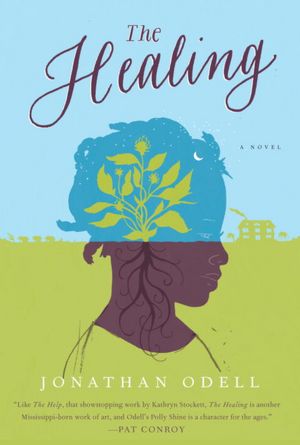 I can admit when I'm late to the dance. I've had the ARC (advanced reader's copy) of this book since October...2011. Right, so for almost 10 months, this book just sat on my Kindle waiting for me to get around to it, but as Polly Shine would say, "I can pour water on your head, but you got to wash yourself."
I can admit when I'm late to the dance. I've had the ARC (advanced reader's copy) of this book since October...2011. Right, so for almost 10 months, this book just sat on my Kindle waiting for me to get around to it, but as Polly Shine would say, "I can pour water on your head, but you got to wash yourself."Who is Polly Shine, you ask? She's the healer and giver of sight to those around her. Things on the Satterfield plantation surely changed for the better the day Polly Shine arrived. Prior to her arrival, Granada, the teller of The Healing, only thought she knew who she was.
Born on the same day that the mistress of the plantation's daughter died, Granada was taken from her mother and given to the mistress as a play thing. Now normally a slave of Granada's complexion would not have been allowed to step foot in the big house. House slaves tended to be light-skinned and were considered more favorable as their appearance was closer to white. As the daughter of a field slave, Granada should have been out in the fields, but grief is a powerful thing and the mistress was willing to overlook the norms.
Granada takes great pleasure in dressing up in the gowns of the deceased daughter of the mistress annually for Preaching Day. Standing at the side of the mistress in the fancy clothes and ribbons gives her such joy that she's willing to ignore the laughs and horrified looks of those around her. Her place is firmly in the big house, next to the mistress.
All of that changes the day Polly Shine arrives. What kind of slave is worth $ 5,000? One that can heal. When slaves on his plantation begin to fall ill, Ben Satterfield, who has never brought in outside slaves, brings in Polly Shine to heal them. Not only that, he has a hospital built for her and gives her Granada as an assistant. Of course, this doesn't sit well with Granada. She belongs in the big house, everyone knows that. But in becoming Polly's assistant, Granada begins to learn and remember what and who she is and to whom she belongs.
Odell touches on so many points with The Healing. There's the constant reminder to and from house slaves that they're better than those that live in the swamps and the fields, simply because of the complexion of their skin.
"Remember, Granada," Sylvie said, "what is bred in the bones will be in the marrow. You ain't like them out in the swamps that got no behavior. You been brought up around white folks and learned their manners. Don't forget that, you hear? You a proper house-raised girl, and you pretty as a pea, even if you is black as the bottom of a pot."
Then there's the slave mentality exhibited by Old Silas, who had been with the master since he was a boy, and resented any thought of freedom. He even goes so far as to tell the master how to keep the other slaves in line by keeping them afraid, rendering them unable to hope.
'Mark my words,' I said, 'when a man's not afraid, then he's hoping. And that's when all hell brakes loose.'
Odell bravely takes on a topic and time period that would normally send white authors running. But he does so respectfully and definitely did his research. Using words of former slaves as recorded in the WPA Slave Narratives, the Fisk Collection of Slave Narratives and oral histories of midwives as his guide, he is dedicated to telling the story accurately. It shows in his work.
352pp
Published: February 2012
Theme: Time After Time by Cassandra Wilson


No comments :
Post a Comment